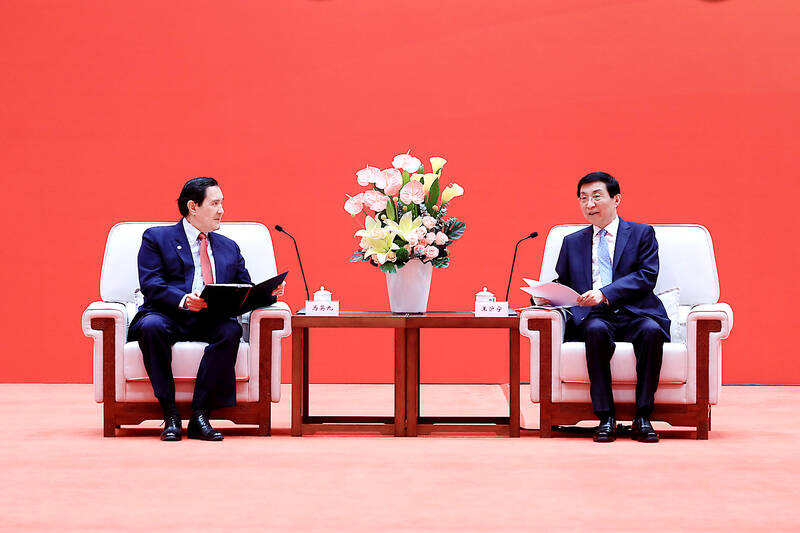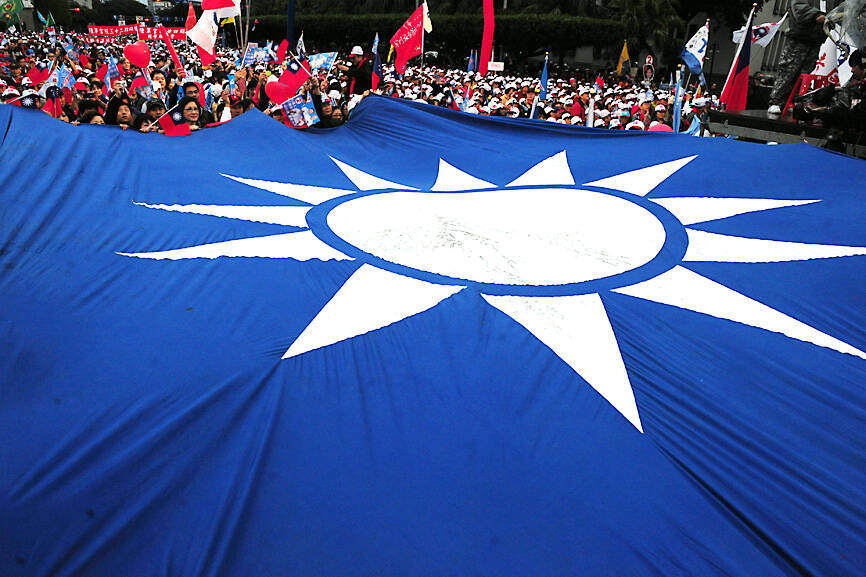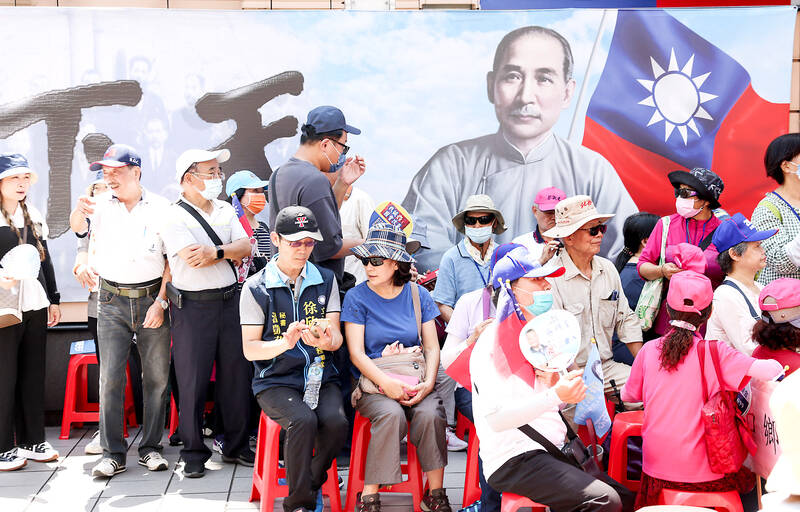There is an old British curse, “may you live in interesting times,” passed off as ancient Chinese wisdom to make it sound more exotic and profound.
We are living in interesting times. From US President Donald Trump’s decision on American tariffs, to how the recalls will play out, to uncertainty about how events are evolving in China, we can do nothing more than wait with bated breath.
At the cusp of potentially momentous change, it is a good time to take stock of the current state of Taiwan’s political parties.

Photo courtesy of the Ma Ying-jeou Foundation
As things stand, all three major parties are struggling.
For our examination of the Taiwan People’s Party (TPP), see a previous edition of this column (“Huang Kuo-chang’s choking the life out of the TPP,” May 28, page 12).
The Democratic Progressive Party (DPP) was detailed in last Saturday’s column (“Challenges amid choppy waters for the DPP,” June 14, page 12).

Photo: AFP
HISTORICAL BAGGAGE
The KMT suffers from long-standing systemic and historical problems that are hard to overcome.
Towering over the KMT electorally is their core “one China principle.” This states that Taiwan is unambiguously a province of China, and is embedded in the KMT-backed “1992 consensus.”

Photo: AFP
Many in the party maintain close ties to China and the Chinese Communist Party (CCP).
Despite promising to increase defense spending to over three percent of GDP, former President Ma Ying-jeou (馬英九) slashed defense spending and came close to handing over Taiwan to the CCP through a services pact that would have allowed them to control strategically critical industries.
These included telecommunications, media, finance, infrastructure, health and much more that would have made it impossible to keep secrets or adequately defend the nation, leaving Taiwan a tributary state at best.
The public reacted, backing the Sunflower Movement in 2014, ending Ma’s attempts at paving the way for unification, a goal he has admitted to trying to accomplish.
Though the party has earned a reputation for effective local governance, since Ma’s presidency, the party has been widely distrusted at the national level over fears of selling out Taiwan’s sovereignty.
The KMT leadership is aware of this, but efforts to restore public trust by abandoning their core “one China” ideology and the deeply unpopular “1992 consensus” have failed due to strong internal resistance. Party leaders and party members remain deeply committed.
Doubling down, Ma is currently in China and used the opportunity to praise Chinese leader Xi Jinping (習近平) for “striving to develop cross-strait peace,” despite increasing military intimidation of Taiwan.
Democratic electorates dislike political parties staying in power for too long, and after eight years of DPP rule, the KMT should have been well-positioned to win the presidency last year.
Yet, voters re-elected a DPP president, though by a much lower margin. By a fairly wide margin, voters picked DPP lawmakers over the KMT, but electoral math gave the KMT the edge and a plurality in the legislature.
As Taiwanese voters have always done, they voted in a third party, in this case the KMT-allied TPP, giving the pan-blue KMT-TPP alliance a legislative majority and a check on the executive branch.
It is popular among KMT politicians to point out that 60 percent of voters did not vote for William Lai (賴清德) as president.
This is factually true, but their implied message that had it been a two-way race with the KMT’s Hou You-ih (侯友宜) instead of a three-way race including the TPP’s Ko Wen-je (柯文哲), Lai would have lost does not hold up.
Facing a seven-point deficit, theoretically, Hou would have won if he had gotten around two-thirds of Ko voters. The problem is Ko voters did not want either the KMT or DPP.
These voters knew their vote would be a safe protest vote against the two major parties. Polling clearly showed a Lai victory on the horizon.
Given a starker choice of Lai versus Hou, some would have voted for Lai over concerns of the closeness of the KMT to the CCP. Others would have stayed home in protest, making Hou’s task even harder.
The result would have been closer, but Lai still had the advantage.
However, by 2028 the DPP will have been in power for 16 years.
This should give the KMT the upper hand, if they can figure out how to overcome suspicions over their “one China” stance and ties to China.
Providing vision on economic and social issues would also go a long way to capturing swing voters tired of DPP rule. This is especially true of younger voters who, by then, will have known nothing but DPP dominance.
DEMONIZING THE DPP
The KMT is not currently showing much vision or positive leadership. Alongside their TPP allies, their legislative majority has shown more interest in hamstringing the DPP administration than in proposing legislation that inspires voters.
It is unlikely that the KMT will make significant moves to tackle major problems like anemic wage growth, skyrocketing property prices, plunging demographics and underweight consumer spending.
The current system was put in place by the KMT, and the DPP has so heavily bought into this system that neither party has the stomach to enact changes. The elites and older demographic bases in both parties are too entrenched in profiting from this system to be willing to endure the painful changes necessary.
This should be fertile ground for the TPP and their younger demographic base, but they are showing no significant leadership on these issues.
Currently lacking any significant alternative vision, both the KMT and the TPP have doubled down on trying to demonize and delegitimize the DPP instead.
In a democracy, a key role of opposition parties is to probe and question to hold the government to account, and in some cases, they did an excellent job, such as exposing the Ultra Source egg importation scandal.
Many of their attacks ring hollow, however.
KMT claims of the DPP “dictatorship” weaponizing the judiciary to detain pro-KMT recall campaign staffers over allegedly forging signatures of names in KMT membership rolls, regardless of their mortal status, are simply diversionary. Prosecutors are working off data collected by local election officials with ties to local KMT governments.
The large number of confessions by KMT recall campaigners and the KMT’s Keelung mayor apologizing for an official allegedly using government household registration data suggest the prosecutors are doing their jobs, not persecuting the KMT.
CHAIR RACE
The party is also facing an ongoing financial crisis and is burdened with crushing debt. Best case scenario is they work through the debt over the next decades; worse case, creditors come knocking and the house of cards falls.
Short term, they are also facing a party chair election in September, which could trigger infighting. Calls are growing to suspend the election, but so are voices supporting Taichung Mayor Lu Shiow-yen (盧秀燕), increasing the uncertainty.
How this plays out will be crucial to the future of the KMT and potentially Taiwan.
Incumbent party Chairman Eric Chu (朱立倫) has proven a very capable party leader. He has restored the KMT’s electoral standing as a formidable party.
He has also had considerable success at keeping the party financially viable.
What Chu lacks is an articulate path forward for the party. He is not a visionary. His positions frequently change, sometimes in the same day, depending on the audience.
Lu has shown herself a solid leader and is appealing to mainstream voters.
This is a good base to work from, but she has yet to be rigorously tested, and crucially on where she stands on China-related issues.
Hou started from a similar position, but never moved beyond vague KMT platitudes, leaving the public unclear where he stood on China. It is not even clear if he had a clear personal stance.
Donovan’s Deep Dives is a regular column by Courtney Donovan Smith (石東文) who writes in-depth analysis on everything about Taiwan’s political scene and geopolitics. Donovan is also the central Taiwan correspondent at ICRT FM100 Radio News, co-publisher of Compass Magazine, co-founder Taiwan Report (report.tw) and former chair of the Taichung American Chamber of Commerce. Follow him on X: @donovan_smith.

Dissident artist Ai Weiwei’s (艾未未) famous return to the People’s Republic of China (PRC) has been overshadowed by the astonishing news of the latest arrests of senior military figures for “corruption,” but it is an interesting piece of news in its own right, though more for what Ai does not understand than for what he does. Ai simply lacks the reflective understanding that the loneliness and isolation he imagines are “European” are simply the joys of life as an expat. That goes both ways: “I love Taiwan!” say many still wet-behind-the-ears expats here, not realizing what they love is being an

Google unveiled an artificial intelligence tool Wednesday that its scientists said would help unravel the mysteries of the human genome — and could one day lead to new treatments for diseases. The deep learning model AlphaGenome was hailed by outside researchers as a “breakthrough” that would let scientists study and even simulate the roots of difficult-to-treat genetic diseases. While the first complete map of the human genome in 2003 “gave us the book of life, reading it remained a challenge,” Pushmeet Kohli, vice president of research at Google DeepMind, told journalists. “We have the text,” he said, which is a sequence of

Every now and then, even hardcore hikers like to sleep in, leave the heavy gear at home and just enjoy a relaxed half-day stroll in the mountains: no cold, no steep uphills, no pressure to walk a certain distance in a day. In the winter, the mild climate and lower elevations of the forests in Taiwan’s far south offer a number of easy escapes like this. A prime example is the river above Mudan Reservoir (牡丹水庫): with shallow water, gentle current, abundant wildlife and a complete lack of tourists, this walk is accessible to nearly everyone but still feels quite remote.

It’s a bold filmmaking choice to have a countdown clock on the screen for most of your movie. In the best-case scenario for a movie like Mercy, in which a Los Angeles detective has to prove his innocence to an artificial intelligence judge within said time limit, it heightens the tension. Who hasn’t gotten sweaty palms in, say, a Mission: Impossible movie when the bomb is ticking down and Tom Cruise still hasn’t cleared the building? Why not just extend it for the duration? Perhaps in a better movie it might have worked. Sadly in Mercy, it’s an ever-present reminder of just